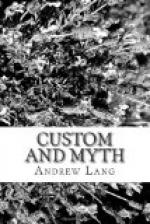Now, was a wand of this form used in classical times to discover hidden objects of value? That wands were used by Scythians and Germans in various methods of casting lots is certain; but that is not the same thing as the working of the twig. Cicero speaks of a fabled wand by which wealth can be procured; but he says nothing of the method of its use, and possibly was only thinking of the rod of Hermes, as described in the Homeric hymn already quoted. There was a Roman play, by Varro, called ‘Virgula Divina’; but it is lost, and throws no light on the subject. A passage usually quoted from Seneca has no more to do with the divining rod than with the telephone. Pliny is a writer extremely fond of marvels; yet when he describes the various modes of finding wells of water, he says nothing about the divining wand. The isolated texts from Scripture which are usually referred to clearly indicate wands of a different sort, if we except Hosea iv. 12, the passage used as motto by the author of ’Lettres qui decouvrent l’illusion des Philosophes sur la Baguette’ (1696). This text is translated in our Bible, ’My people ask counsel at their stocks, and their staff declareth unto them! Now, we have here no reference to the search for wells and minerals, but to a form of divination for which the modern twig has ceased to be applied. In rural England people use the wand to find water, but not to give advice, or to detect thieves or murderers; but, as we shall see, the rod has been very much used for these purposes within the last three centuries.
This brings us to the moral powers of the twig; and here we find some assistance in our inquiry from the practices of uncivilised races. In 1719 John Bell was travelling across Asia; he fell in with a Russian merchant, who told him of a custom common among the Mongols. The Russian had lost certain pieces of cloth, which were stolen out of his tent. The Kutuchtu Lama ordered the proper steps to be taken to find out the thief. ’One of the Lamas took a bench with four feet, and after turning it in several directions, at last it pointed directly to the tent where the stolen goods were concealed. The Lama now mounted across the bench, and soon carried it, or, as was commonly believed, it carried him, to the very tent, where he ordered the damask to be produced. The demand was directly complied with; for it is vain in such cases to offer any excuse.’ {184a} Here we have not a wand, indeed, but a wooden object which turned in the direction, not of water or minerals, but of human guilt. A better instance is given by the Rev. H. Rowley, in his account of the Mauganja. {184b} A thief had stolen some corn. The medicine-man, or sorcerer, produced two sticks, which he gave to four young men, two holding each stick. The medicine-man danced and sang a magical incantation, while a zebra-tail and a rattle were shaken over the holders of the sticks. ’After a while, the men with the sticks had spasmodic twitchings of




